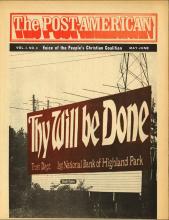Clarence Jordan is particularly well-suited to speak on this subject, and his examples of both anger and love are vivid. For many years before his death in 1969 he was a leader of Koinonia Farm, a Christian community in southwest Georgia, dedicated to living out the way of Jesus. The clear witness of Koinonia Farm against race prejudice made it the object of hostility in the 1950s. For several years Clarence Jordan, his family, and friends withstood shootings, beatings, and an economic boycott. A host of friends throughout the world helped Koinonia survive the nightmare. The crisis of overt violence finally passed, though over the years since there have been occasional acts of violence directed toward the community or its members. Through this troubled time, those at the farm have been committed to respond with compassionate love. Clarence Jordan was a southerner, with the dialect and lore, the gentle manner, and rippling humor of the South flowing through his veins. He was a scholar with a doctoral degree in New Testament Greek, as well as a degree in agriculture. The work to which he dedicated his life continues. Until his death he was deeply involved in a new movement centering at Koinonia Farm, but worldwide in scope. Called Koinonia Partners, this movement has three prongs: 1) communicating the gospel message through speaking, writing, books, and records; 2) instructing serious Christians in the radical ideas of the gospel; 3) applying the message that is presented and taught. On the 1,400 acre farm, blacks and whites work together in a spirit of partnership in farming ventures and in a pecan processing plant. A 42-house subdivision for displaced rural families is in development.
Read the Full Article
To continue reading this article — and get full access to all our magazine content — subscribe now for as little as $4.95. Your subscription helps sustain our nonprofit journalism and allows us to pay authors for their terrific work! Thank you for your support.
Already a subscriber?
Login
